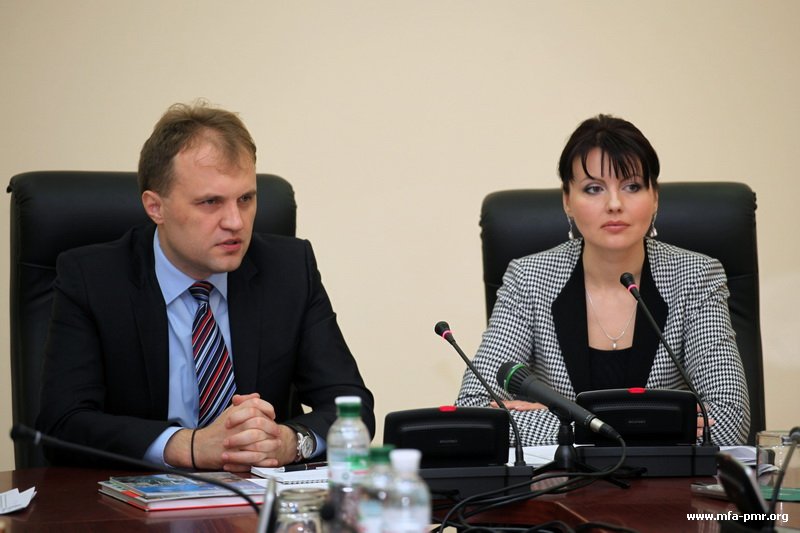
The Kremlin Politically Fortifies Its Military Presence in Transnistria
Publication: Eurasia Daily Monitor Volume: 9 Issue: 114
By:

On June 4, Russian Deputy Foreign Minister Grigory Karasin met in Moscow with Nina Shtansky, the “foreign minister” of Moldova’s breakaway region of Transnistria. To justify why the meeting bypassed and excluded Moldovan representatives, the Russian press-release identified Shtansky as “the political representative of Transnistria on negotiations for the resolution of the Transnistrian conflict” (Mid.ru, June 4).
The deliberate description of Shtansky in the press release was thus meant to provide the Russian Ministry of Foreign Affairs with a ready response to accusations of Moscow’s lack of impartiality as conflict mediator in the Transnistria negotiations. But why did Russia publicize its meeting with the Transnistrians at all if Moscow wishes to preserve its cherished official status of “impartial mediator” in the negotiations?
Most importantly, Russian reports of the meeting served to signal Russia’s unwillingness to discuss the form or status of its military peacekeeping operation in Transnistria with EU and US representatives. Karasin and Shtansky asserted in their meeting that the question of Russia’s peacekeeping format may only be addressed by the official participants to the conflict resolution process – Russia, Moldova, the Transnistria region and Ukraine – and does not fall under the mandate of the wider “5+2” group (which also includes the OSCE, as well as the US and the EU as observers).
This interpretation is not shared by the other participants to the negotiations. Rather, it is dictated by Russia’s desire to preserve the status quo in Moldova and its breakaway territory. Indeed, the continued presence of Russian boots on the ground in Transnistria represents a relatively cheap way for Moscow to guarantee and maintain its monopoly over the course and agenda of the negotiations.
The diplomatic recognition of Kosovo by many Western states, which was under the control of their peacekeepers, crystallized for the Kremlin the dictum that physical control of a territory is paramount for political control. Therefore, maintaining Russia’s current peacekeeping operation format is, in fact, essential for Moscow’s strategy in Transnistrian negotiations.
Russia’s military presence in Transnistria is perceived by Tiraspol’s leadership as the symbolic stick – a power projection device that makes Russian policy preferences difficult, if not dangerous to oppose. It also makes EU and other Western donors less enthusiastic about offering direct assistance to Tiraspol, due to the breakaway region’s inability to control its spending – stemming from Russia’s coercion. Thus, Transnistrian leaders are only left with the option of Russian funding, which is basically used to cover salaries and welfare payments (PMRinform, May 4). If the Russian “peacekeepers” were to be replaced by a true international peacekeeping force, Moscow’s political pressure on Tiraspol would decrease, and Transnistria would benefit from a much more beneficial environment for international aid and investment.
There is local-level interest and demand for international funding in Transnistria – specifically, the Kamenka and Rybnitsa district authorities expressed their desire to join the “Dniester” European regional development project (mfa-pmr.org, May 12). However, the previous Transnistrian administration of Igor Smirnov deliberately made unrealistic demands (such as veto rights) in exchange for Transnistria’s participation in the “Dniester” economic project (Nr2.ru/pmr, June 24, 2010). Unlike Smirnov and his family (see Kommersant, April 4), the breakaway territory’s new head, Yevgeny Shevchuk, has not yet acquired substantial personal economic interests linked to Russia. As a result, this may have opened a small window of opportunity for initiating joint EU-Moldovan economic projects in Transnistria.
The biggest problem with EU projects, however, is that they are cumbersome bureaucratic mechanisms and are very slow in effectively reacting to changes on the ground. Thus, when the newly elected Transnistrian “president” Shevchuk faced a severe budget deficit earlier this year, he found he had nobody to turn to for help except for Moscow (Nr2.ru/pmr, January 3; January 5; January 19; February 7). Consequently, a few months later, when the Russian loans came due, Shevchuk declared that Transnistria was willing to join the Russian-led Eurasian Economic Union. He also echoed Moscow’s demand to freely open a Russian consulate in Tiraspol (Nr2.ru/pmr, May 30).
The opportunities opened after the change of leadership in Transnistria will soon be gone. Unlike the EU, Russia has reacted promptly, starting to build dependency mechanisms – including economic aid – which aim to tie Shevchuk. Moscow seeks to return to the Smirnov era status quo in its relations with Tiraspol. By keeping military control of the territory, Russia wants to discourage Transnistrian elites from pursuing any economic or political interactions with the EU and Moldova, thus leaving Transnistria no other viable alternative besides Russia.
The specific appointment of deputy prime minister Dmitry Rogozin as the Russian presidential envoy for Transnistria (see EDM, March 23, April 20) seems to support the military’s centrality to Russia’s strategy in Transnistria. While Rogozin is most commonly referred to in the media as the official supervising the armaments industry, his range of responsibilities in the current Russian government is much larger. Rogozin is first of all overseeing and coordinating the questions of national defense and borders, meaning he works closely with the Russian military and the Federal Security Service (FSB). And it is the Russian Ministry of Defense as well as the FSB that run Moscow’s “peacekeeping” presence in the Transnistrian region of Moldova.
As Transnistrian negotiations are technically a foreign policy issue, normally they would be dealt with by first deputy prime minister Igor Shuvalov, who oversees Russian foreign policy along with economic relations within the Commonwealth of Independent States (CIS – of which Moldova is also a full member). Yet, due to the key importance the Kremlin places on Russia’s military presence in Transnistria, Rogozin’s military portfolio in Dmitry Medvedev’s government makes him the logical candidate for overseeing the Transnistrian conflict negotiations. Moreover, as is evident from the June 4 meeting between Karasin and Shtansky, even the Russian Foreign Ministry is throwing its weight behind Moscow’s peacekeeping format.
However, Russia’s “peacekeeping” operation in Transnistria is also a major vulnerability because it stands on shaky ground when judged against UN peacekeeping standards (see https://www.nycbar.org/pdf/report/NYCity%20BarTransnistriaReport.pdf). If it is ever replaced with an international operation, it will effectively deny Russia the monopolistic control it currently enjoys over the Transnistria negotiations.




